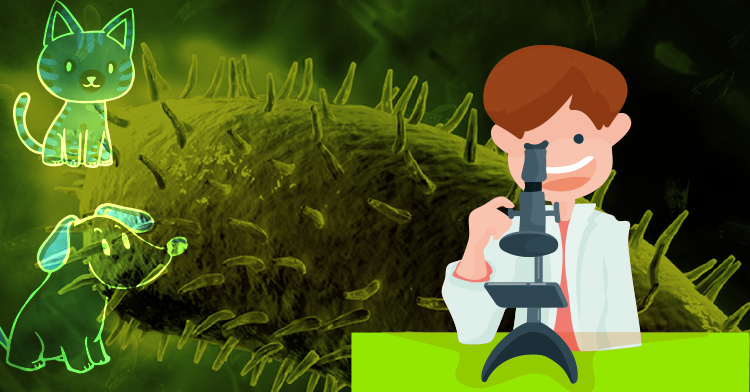
Rabies is an ancient disease, present in history, literature, and medicine. In the early civilizations of the Middle East, such as Egypt and Mesopotamia, descriptions of this disease appear, and it is even mentioned in the Code of Eshunna, in 2300 b.c. and in the Iliad, Homer qualifies Hector as "rabid".
In antiquity, the pre-Socratic philosophers, Demosthenes and Epicormics called rabies "lyssa", a Greek word meaning "worm", since it was believed to be caused by worms that invaded the brain from under the tongue, a belief that lasted until the eighteenth century.
Today we know that rabies is caused by a virus with a characteristic bullet shape (genus Lyssavirus) and that it is transmitted mainly through the saliva of animals infected with the virus.
The symptoms of rabies are not immediate. When an animal, or human, acquires the infection by rabies, clinical manifestations appear after a very variable incubation period, which can range from ten days to six months. As the rabies virus replicates and disperses through the nervous system, it triggers an inflammation of the spinal cord and brain that ends up producing death.
This disease can manifest itself in two ways: furious rage, in which there is hyperactivity, excitement, fear of water; or paralytic rage; in which the muscles are progressively paralyzed from the place where the virus entered.
According to the World Health Organization (WHO), 99% of cases of transmission of rabies to humans occur because of the bite of a dog infected with the rabies virus. Already from Ancient Greece Aristotle spoke of dogs as a possible route of transmission of this disease.
In the early 1880s, Louis Pasteur conducted research on several infectious diseases, including rabies. By 1885 he managed to prevent this disease in Joseph Meister, a 9-year-old boy who had been attacked by a rabid dog. The procedure that Pasteur carried out was to inoculate the attenuated virus in the child, that is, by applying a vaccine.
For this reason, every September 28, the World Day against Rabies is celebrated, since on this date the death anniversary of Louis Pasteur is celebrated.

To prevent rabies, countries perform various strategies, including mass rabies vaccination of dogs and cats.
Each year the Ministry of Health conducts free anti-rabies vaccination campaigns for dogs and cats, apply millions of doses of vaccines.
Thanks to this, since 2006 Mexico has no cases of rabies transmitted by dogs.
At the individual level, in case of being bitten by a dog, it is very important to wash immediately and thoroughly the wound with soap and water for a minimum of 15 minutes and go to the nearest health unit to receive treatment.
Follow us on Twitter:@SSalud_mx and @JoseNarroR
Facebook: @SecretariadeSaludMX and @JoseNarroOficial
You Tube: Secretaría de Salud México
